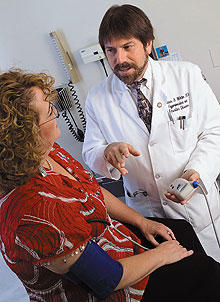  |
| HOME | THIS ISSUE | CALENDAR | GRANTS | BACK ISSUES | < BACK | NEXT > |
Study to look at effects of smoking on high blood pressureby Maureen McGuire - April 20, 2009
|
||||
| Health Center researchers are looking for smokers who want to kick the habit and have also been diagnosed with high blood pressure. The researchers are seeking study participants diagnosed with either pre-hypertension or stage one hypertension. Co-investigators Drs. William White, Nancy Petry, and Sheila Alessi and a team of researchers will measure the impact of smoking and smoking cessation on blood pressure, using a 24-hour blood pressure monitoring device, and at the same time, compare two approaches to helping smokers quit. The four-year study is supported by a National Institutes of Health grant to the Pat and Jim Calhoun Cardiology Center. White, a professor of medicine, is an internationally recognized expert in the treatment of hypertension and editor-in-chief of a peer-reviewed journal, Blood Pressure Monitoring. He has long championed the role of 24-hour monitoring to capture the most accurate picture of blood pressure fluctuations throughout the day. “While smoking is a known and potent risk factor for heart disease and stroke, there is still more to learn about how smoking affects blood pressure, especially over a complete, 24-hour profile,” White says. “We do know that right after someone smokes a cigarette, the nicotine can raise both the blood pressure and the pulse rate, but the duration and burden that this creates is not as well known. “When patients stop smoking and start a medicine like varenicline,” he adds, “we need to understand how this affects their blood pressure, not only in the doctor’s office but over the course of a day in the life of a patient suffering from hypertension.” To help participants quit smoking, the study will randomly divide participants into two groups. Both groups will be treated with varenicline, also known as Chantix, an FDA-approved smoking cessation medication. Several studies have shown that varenicline can more than double the chances of successfully quitting, compared to other types of treatment. The difference between the groups will be the type of counseling participants receive in conjunction with the medication. One group will participate in traditional, individual counseling, and the other will receive “contingency management” counseling.
Contingency management is an incentive-based intervention in which participants receive prizes, such as vouchers or small gifts, for compliance – in this case, for not smoking. It has been used to treat a variety of addictive disorders. In recent years, its success rates have gained national attention, as well as increased credibility in the medical community. “In essence, contingency management is the same technique that parents use with children every day by rewarding good behavior. It is behavior modification and behavior shaping,” says Dr. Nancy Petry, a professor of medicine. Petry is a prominent researcher in the field of addiction treatments, including drug and gambling addictions, and a leader in contingency management research. “Several studies have indicated that combining medical approaches with counseling can vastly improve a smoker’s chance to quit for good,” Petry says. “This study will help to answer questions about the role of contingency management counseling in motivating smokers to stay away from cigarettes over the short term as well as in the long run.” Study participants will be treated actively, free of charge, for at least three to six months, and will be followed for one year. Participants must be over 18 and can already be taking medicine to reduce their blood pressure. Stage one hypertension is defined as blood pressure in which the systolic reading is between 130 and 160 and the diastolic reading is between 80 and 100, for example 140/90. For more information or to participate in the study, call 860-372-8418. |
| ADVANCE HOME UCONN HOME |

